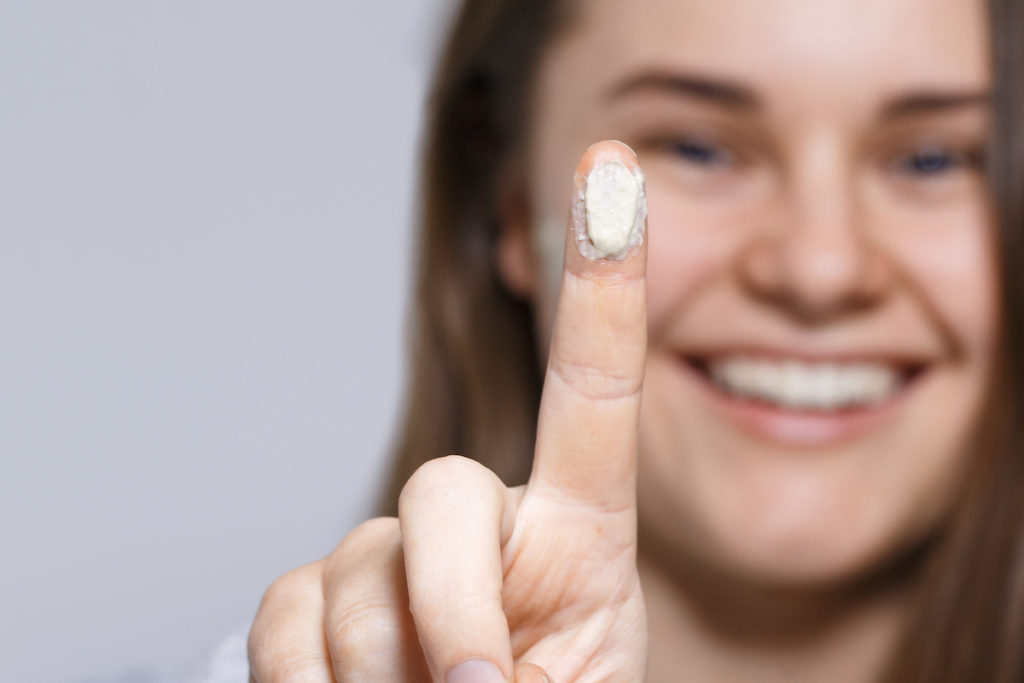New skincare and cosmetics must be formulated to be compatible with their purpose and the area on the body they’re meant for, e.g. face, hair, and scalp, for babies, kids, and adults. They also need to be tested to make sure they’re safe to use and are not likely to cause skin irritation or an allergic reaction. Safety testing is usually done while a product is being developed before it hits the market.
When developing ecostore products, we draw on the knowledge of trusted international resources like the EWG Skin Deep® Cosmetic Database, and standards like Ecocert and COSMOS, to help us assess the safety of every ingredient we use.
TESTING SKINCARE ON ANIMALS – WHAT’S THE ALTERNATIVE?
Skincare brands can choose cruelty-free testing methods, like computer modeling, cell cultures, and human skin patch tests. Many skincare ingredients have already been tested extensively, generating information that lets companies predict the safety of a formulation. This means they can start clinical skin patch tests, and avoid animal testing.
In many countries, testing cosmetic ingredients and/or products is banned or phased out, as effective cruelty-free methods let skincare brands steer away from animal testing.
Some brands don’t test on animals themselves, but they sell in China, just like our brand. However, since we’re only selling online, we’re not required to test on animals. Our products won’t be sold in physical stores as long as animal testing is required.
To avoid products that have been tested on animals, look for a ‘cruelty-free’ mark on the pack. When developing ecostore products, we do lots of testing in-house and with independent labs that only test on healthy human volunteers. And we believe the RIPT test is one of the best for testing skincare safety.
WHAT IS THE RIPT TEST?
‘RIPT’ (or HRIPT) means (Human) Repeat Insult Patch Test. This controlled scientific test aims to detect the potential for irritation and sensitisation (an allergic response that develops over time and with repeated exposure).
The test involves applying the product or ingredient, to an area of skin on the back, followed by a rest. Then it’s applied again, and the skin is evaluated for any reaction. During some of the testing stages, hypoallergenic patches cover the product. The patch is removed after 24 hours, and the skin responses are measured after 48 hrs. The product is applied to the same area another nine times, and any irritation is noted. After 10- 21 days of no product, a patch is applied to a different area.
Our Ultra Sensitive range has been tested by an independent laboratory in Europe using a RIPT test method (Repeat Insult Patch Test) on a self-selected Sensitive Skin panel of 50 usually in the age group of 20-60. In this method, a small amount of product is applied to the back of a person and then covered with a semi-occlusive patch. The product is re-applied on the same spot another 9 times within a span of 3 weeks. Then the patch is removed and no product is applied for next the two weeks calling this phase a resting phase. After such time, the product once again is applied to the same spot and another random spot to see if any reaction has occurred. If there is no reaction in both sites then they are passed as non-sensitising.
KINDER TO SKIN
While some of the ecostore products are dermatologically tested, all of our products are formulated with skin-loving, plant and mineral-based ingredients, and naturally-derived fragrances that are shown to be gentle and kind to all skin types.
We check all our ingredients against international safety standards when developing our products. If there’s ever any doubt about an ingredient’s safety, we look for an alternative. We make our products to the highest quality and environmental standards, so you can be sure they’re safer for you and our world.
